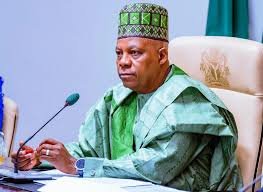Nigeria’s Vice-President, Kashim Shettima, has renewed the country’s call for a permanent seat on the United Nations Security Council (UNSC) despite mounting criticism over widespread corruption, economic hardship, and faltering leadership in Nigeria.
Shettima met with UN Secretary-General António Guterres at the UN headquarters in New York, where he emphasized Nigeria’s determination to secure a permanent slot on the Council. The meeting came at a critical time as the country prepares for general elections within the next year, underscoring both Nigeria’s global ambitions and its domestic struggles.
According to the Vice-President, Nigeria remains committed to working closely with the UN on pressing global issues, including the pursuit of the Sustainable Development Goals (SDGs), tackling the impact of climate change, and strengthening democratic institutions across Africa. Guterres, in response, praised Nigeria’s continued engagement with the UN and acknowledged its push for stronger participation in emerging areas such as artificial intelligence and technological innovation.
Read also:
While the diplomatic efforts signal Nigeria’s desire to play a larger role in global governance, critics argue that the government’s focus on international recognition contrasts sharply with the realities at home. Citizens continue to grapple with high levels of poverty, insecurity, unemployment, and what many describe as systemic corruption that undermines development.
The meeting also highlighted the strong footprint of the United Nations in Nigeria, where several agencies are actively working on humanitarian relief, development programs, and institutional reforms. Yet, the country’s insistence on a Security Council seat raises questions about whether global ambitions are being prioritized over urgent domestic reforms.
For the Tinubu administration, securing a permanent UNSC seat would represent a major diplomatic victory and elevate Nigeria’s status on the world stage. However, for many Nigerians, the more pressing concern remains whether such symbolic wins will translate into meaningful change in governance, accountability, and quality of life at home.






